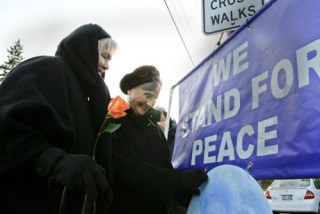For seven years’ worth of Fridays, they’ve been a silent presence on one of the busiest corners in town.
Tonight marks their last stand.
“To everything there is a season, and a time to every purpose under the heaven,” said longtime Women in Black member Jan Bailey, quoting Ecclesiastes 3.
“Knees are giving out,” Donna Moore added.
Joke aside, members of Bainbridge Island Women in Black insist that there’s no specific political impetus for stopping their weekly peace vigils after all these years.
It’s not the glimmer of possibility that American troops could begin to withdraw from Iraq, and it’s not that George W. Bush has left office, replaced by a more progressive administration and therefore little to stand against.
In fact, while domestic and international conflict was what sparked their wish to step up, Women in Black are firm in their belief that they are not fighting anything. After all, Moore said, being against something necessarily means you’re in conflict.
Which is not their business, even if it were something they believed they actually could stop.
“We are there for, not against,” Bailey said. “We are specifically for non-violent solutions to problems.”
Four women formed Bainbridge Island’s WIB in March 2002, part of a loosely organized international group that originally comprised Israeli and Palestinian women coming together in 1988 to protest Israel’s occupation of the West Bank and Gaza. Mournful black, with no words, were critical components of the presentation.
“The two came together to create stillness, and it is a stillness of the soul,” Bailey said.
The first four, including co-organizer Kathy Horsley, began spreading the word. (As Bailey put it, they are a talkative bunch outside Friday evenings.)
Mary Piette said she was listening to Horsley describe the effort one Sunday morning.
“I was sitting in the back of the church, and I just went, ‘Yes.’ I think that’s what happened with everybody,” Piette said.
By mid-June, the group had risen to 14 participants and kept growing. Over the years, vigils and activities expanded to include anniversaries of key conflicts; war memorials – one Iraq memorial drew 100; and sending care packages to American soldiers overseas.
They used to commemorate 9/11 but stopped.
“It had become a shibboleth for war, and we didn’t want to support that,” Bailey said.
There has always been an aspect of theater to the weekly stance; Bobbie Morgan recalled seeing a Women in Black group in Seattle several years ago when she was shopping at Westlake Center. She stood transfixed for several minutes.
“Silent, in black – I think they might have had a sign or candles or something. It was stunning,” she said. “And one of the women mouthed, ‘Come join us.’ And I just had this feeling.”
At one Bainbridge vigil, a teenage girl approached them and said, furiously, “You just stand there!”
“And I thought, ‘Aha, we got her. You should be mad,’” Bailey said.
Responses from passers-by have varied. Some honk, give the “V” sign for peace, or offer a thumbs-up. Others, even if they feel supportive, have been afraid to talk to the women “because they thought of us as nuns. They were afraid to talk to us because they thought it would be improper,” Bailey said.
Some people have skulked by with backward dirty looks or muttered comments; one member got a hushed “F-you.”
Other responses were more overt, as on one Friday on an anniversary of the conflict in Iraq. On that day, a group of opposers stood on the opposite corner raising signs that said “United we stand” and “If you’re not with us, you’re a terrorist.”
That sentiment, incidentally, always dumbfounded Moore, a former State Department employee. After all, they were a bunch of retired ladies standing there with a peace sign. What was so scary about that? The following week, some members of the WIB walked cookies over to the protesters.
“It was a beautiful example of how antagonistic people can be, and how peace can smooth things over,” Moore said.
Moore is clear that Women in Black is not “just a bunch of Democratic women doing good.” On the other hand, the core group frankly admits that they’ve had numerous discussions over the years about whether they’ve accomplished anything.
But this questioning is almost as compelling as their stance because it points to a collective humanity. The members of the Women in Black are, without exception, full of humor, doubt, inquisitiveness, and fallibility. They relish these characteristics, just as they relish their diversity of opinions and styles and the sometimes lengthy process of reaching consensus.
There is also, several women said, an internal, meditative process that occurs when they’re standing in silence. Whether or not external results are evident, a personal transformation invariably occurs.
“To be with a group of women and share that bond in silence, is nurturing,” Morgan said.
The group did consider continuing with weekly vigils, to show its support for President Obama. They believe he needs all the support he can get.
But in the end, that reasoning wasn’t enough.
“It’s simply time to quit,” Bailey said. “When the energy is gone, you need to put your energy toward something else.”


